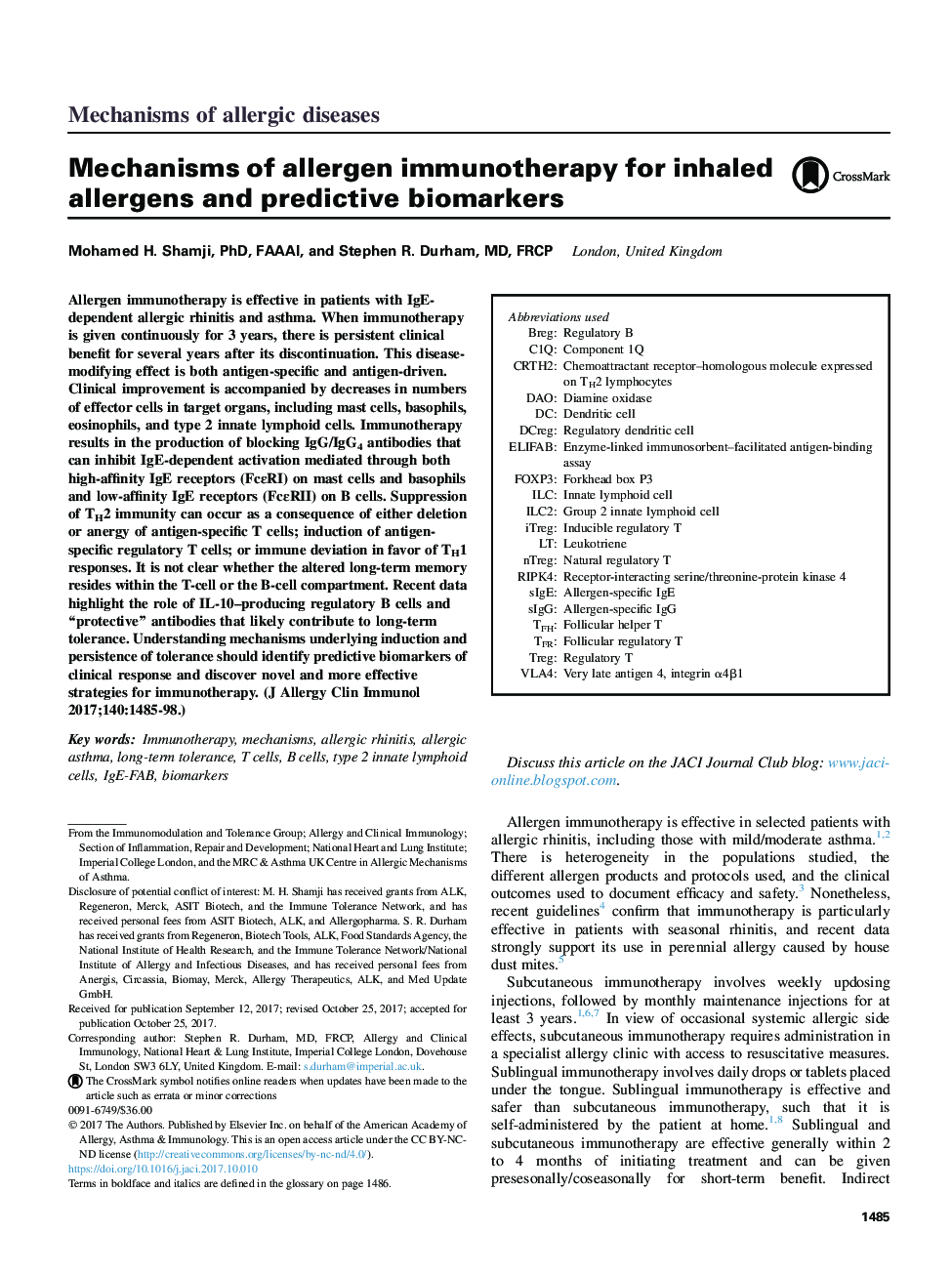| کد مقاله | کد نشریه | سال انتشار | مقاله انگلیسی | نسخه تمام متن |
|---|---|---|---|---|
| 8713899 | 1587109 | 2017 | 14 صفحه PDF | دانلود رایگان |
عنوان انگلیسی مقاله ISI
Mechanisms of allergen immunotherapy for inhaled allergens and predictive biomarkers
ترجمه فارسی عنوان
مکانیسم های ایمنوتراپی آلرژیک برای آلرژن های استنشاقی و زیست شناسان پیش بینی شده
دانلود مقاله + سفارش ترجمه
دانلود مقاله ISI انگلیسی
رایگان برای ایرانیان
کلمات کلیدی
FOXP3DCregNatural regulatory TsIgGVLA4Chemoattractant receptor–homologous molecule expressed on TH2 lymphocytesRIPK4regulatory Bfollicular helper TnTregC1qTFHiTregILC2TregTFRCRTH2ILCAllergen-specific IgE - IgE اختصاصی آلرژنAllergic asthma - آسم آلرژیکimmunotherapy - ایمونوتراپیBreg - برگیforkhead box P3 - جعبه جعبه P3DAO - دائوDiamine oxidase - دیامین اکسیدازAllergic rhinitis - رینیت آلرژیکDendritic cell - سلول دندریتیکinnate lymphoid cell - سلول لنفاوی ذاتیB cells - سلول های BT cells - سلول های تیtype 2 innate lymphoid cells - سلول های لنفاوی ذاتی نوع 2Group 2 innate lymphoid cell - سلول های لنفاوی ذاتی گروه 2Leukotriene - لکوترینRegulatory T - مقررات TMechanisms - مکانیسم هاBiomarkers - نشانگر زیستی یا بیومارکرsIgE - گفتن
موضوعات مرتبط
علوم زیستی و بیوفناوری
ایمنی شناسی و میکروب شناسی
ایمونولوژی
چکیده انگلیسی
Allergen immunotherapy is effective in patients with IgE-dependent allergic rhinitis and asthma. When immunotherapy is given continuously for 3 years, there is persistent clinical benefit for several years after its discontinuation. This disease-modifying effect is both antigen-specific and antigen-driven. Clinical improvement is accompanied by decreases in numbers of effector cells in target organs, including mast cells, basophils, eosinophils, and type 2 innate lymphoid cells. Immunotherapy results in the production of blocking IgG/IgG4 antibodies that can inhibit IgE-dependent activation mediated through both high-affinity IgE receptors (FcεRI) on mast cells and basophils and low-affinity IgE receptors (FcεRII) on B cells. Suppression of TH2 immunity can occur as a consequence of either deletion or anergy of antigen-specific T cells; induction of antigen-specific regulatory T cells; or immune deviation in favor of TH1 responses. It is not clear whether the altered long-term memory resides within the T-cell or the B-cell compartment. Recent data highlight the role of IL-10-producing regulatory B cells and “protective” antibodies that likely contribute to long-term tolerance. Understanding mechanisms underlying induction and persistence of tolerance should identify predictive biomarkers of clinical response and discover novel and more effective strategies for immunotherapy.
ناشر
Database: Elsevier - ScienceDirect (ساینس دایرکت)
Journal: Journal of Allergy and Clinical Immunology - Volume 140, Issue 6, December 2017, Pages 1485-1498
Journal: Journal of Allergy and Clinical Immunology - Volume 140, Issue 6, December 2017, Pages 1485-1498
نویسندگان
Mohamed H. PhD, FAAAI, Stephen R. MD, FRCP,
